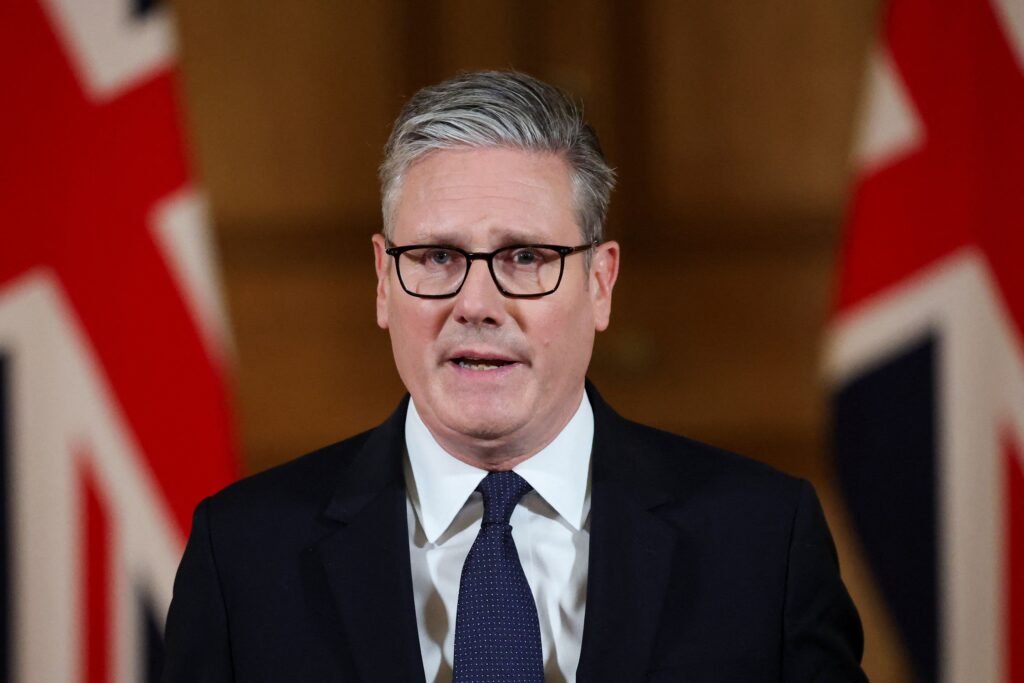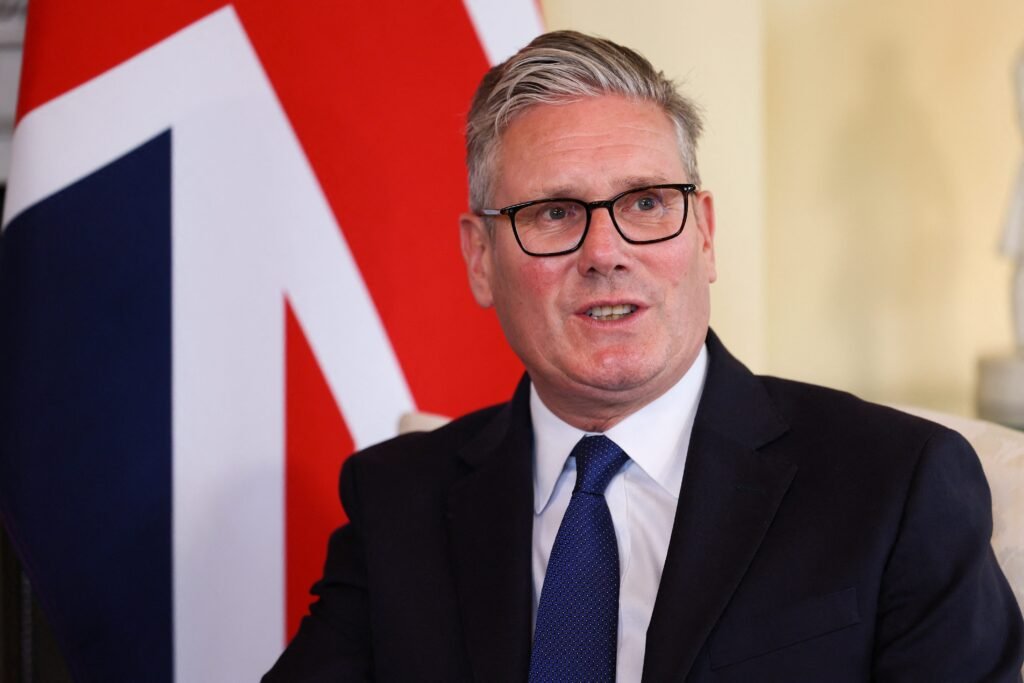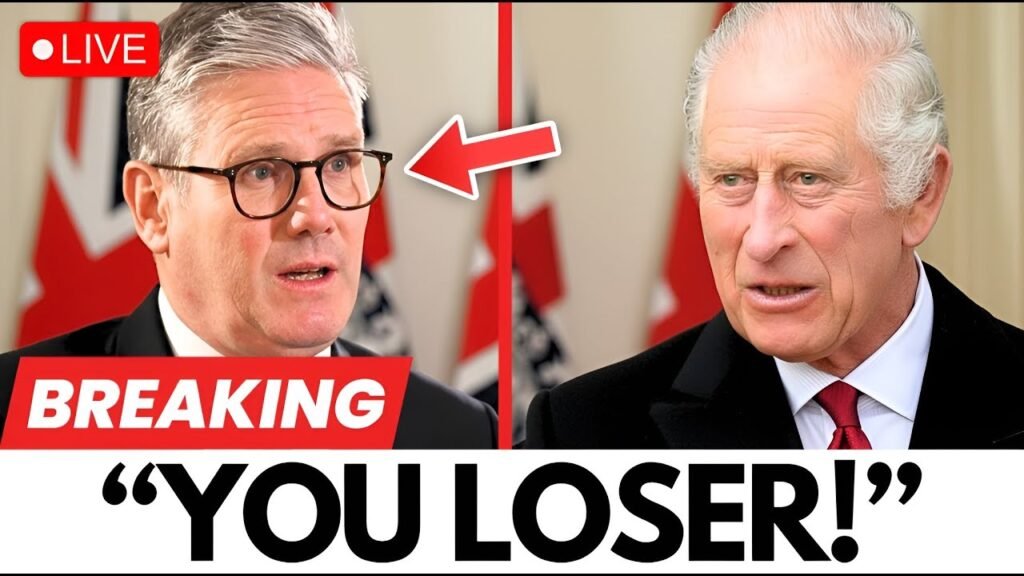It was a scene no one anticipated, and yet, in retrospect, the signs had been building for weeks—quiet shifts in protocol, murmured changes in briefing schedules, and an uncharacteristic edge to Buckingham Palace communications. But nothing could have prepared the British public—or the world—for the seismic political upheaval that erupted live on national television during what was expected to be a routine address.
The constitutional monarch, King Charles III, long known for his measured tone and diplomatic restraint, shattered protocol and precedent with an unfiltered, emotionally charged denunciation of Prime Minister Keir Starmer, triggered by the sudden live exposure of a secret deal that had allegedly been orchestrated in the shadows of Whitehall.
The setting was the King’s scheduled weekly address to the nation—typically a ceremonial affair designed to reinforce stability. Yet this address would go down in history not for its tone of reassurance, but for the visible fury of a monarch caught between duty and outrage. Just seconds before cameras rolled, sources now confirm, the King was handed a classified briefing—an encrypted dispatch from MI5 analysts outlining a covert policy exchange that had not passed through any formal channels of parliamentary debate.
The “Starmer Accord,” as it’s now being dubbed, appeared to be an unauthorized geopolitical arrangement between Starmer’s office and a closed consortium of private defense contractors, foreign energy brokers, and policy advisors from Brussels, all of whom had allegedly collaborated on a plan to realign the UK’s sovereignty on key national interests.

As the cameras turned on, King Charles’ expression betrayed something rare: raw, unfiltered disbelief. His voice, typically steady, cracked slightly before he began. But within minutes, disbelief had turned to fury. “The British people,” the King declared mid-broadcast, “have not consented to the dismantling of their constitutional voice. I will not be complicit in this quiet betrayal.”
The BBC studio, unprepared for the deviation from script, allowed the broadcast to continue for nearly 17 minutes before a delayed contingency team cut the live feed. But by then, the footage had already gone viral, simulcast to millions across television and digital networks. Every word was dissected, every syllable replayed.
Related Post: 1 MIN AGO: Nigel Farage To Receive Knighthood from King Charles — UK Politics ERUPTS!
According to whistleblowers within the Cabinet Office—three of whom have now spoken under strict anonymity—a covert strategy had been in motion for nearly nine months. The goal? To circumvent parliamentary deadlock on controversial defense alignment proposals with the European Union.
These proposals, many of which had been rejected outright in the Commons, centered around expanded intelligence-sharing protocols, joint military procurement initiatives, and strategic base-sharing programs in Northern Europe. But the heart of the controversy was not the policy itself—it was the method.
Documents now being released by investigative journalists from multiple outlets, including The Guardian and Declassified UK, suggest that a set of off-the-books negotiations were conducted between Starmer’s inner circle and representatives from an EU security commission known as “EuroShield.”
The alleged memorandum outlined a fast-track integration scheme under which UK forces would enter into permanent operational readiness agreements with European counterparts, bypassing public referendum and parliamentary scrutiny. In exchange, British stakeholders—including unnamed parties in the private defense sector—would receive preferential access to a newly created European Defense Innovation Fund.
It was, by all definitions, a shadow treaty.
The King’s outrage was not just personal; it was constitutional. Under the conventions of the British political system, while the monarch reigns, the government rules. The Sovereign must remain neutral, a ceremonial symbol of unity. But what happens when that system itself is subverted from within? That’s the question legal scholars are now scrambling to answer.
According to Lord Alton-Kent, a retired constitutional expert and former peer in the House of Lords, “This is uncharted territory. The monarchy has not intervened politically in this manner since Edward VIII—and that was in a context of personal scandal. What we have here is the suggestion that the King believes the Prime Minister has violated the very structures of British governance.”
Reactions have been fierce and divided. Within hours of the King’s broadcast, opposition parties convened emergency press conferences. The Liberal Democrats called for a formal inquiry. The Scottish National Party went further, demanding immediate transparency on the terms of what they called “an undeclared treaty with Europe.”
Meanwhile, former Tory leadership contenders seized on the moment to launch a scathing critique of Starmer’s credibility. Yet, the Prime Minister’s office issued only a muted statement, describing the allegations as “mischaracterized interpretations of ongoing intergovernmental consultations.” That vague wording did little to stem the growing unrest.
Among the most explosive revelations to emerge from the leaked documents is the alleged involvement of Artemis Solutions, a defense-tech startup with deep connections to both Whitehall procurement officers and EU strategic planning boards. Artemis, until recently, was little more than a mid-tier contractor providing drone surveillance equipment.
But within six months, it became the beneficiary of four separate defense contracts—none of which were publicly disclosed under standard competitive bidding processes. Investigators are now probing whether Artemis served as a conduit for informal diplomatic communications, effectively acting as an intermediary between Downing Street and EuroShield negotiators.

Insiders say that King Charles had long expressed concern over increasing opacity in Starmer’s handling of defense and energy policy. His regular briefings with the Prime Minister had reportedly grown tense, with sources inside Buckingham Palace suggesting that Starmer became dismissive when asked to clarify the constitutional grounds for bypassing Parliament on military matters.
One palace aide, who spoke under condition of anonymity, claimed that the King had received “detailed dossiers” from independent watchdogs weeks before the live broadcast, but waited until confirmation from national security agencies before reacting publicly.
The legal implications of the King’s intervention are profound. Parliament is now facing calls to invoke emergency constitutional review procedures. Some MPs have proposed a select committee to investigate the extent of executive overreach. Others are pushing for the Prime Minister to submit to a formal inquiry before the Privy Council.
Yet a darker question looms: if it is proven that the Prime Minister deliberately circumvented constitutional norms to commit the UK to binding defense arrangements, does that amount to treason? No one in modern British politics has dared to approach that line—until now.
Meanwhile, civil unrest is simmering. Protesters gathered outside Westminster within hours of the broadcast, some waving Union Jacks, others holding placards demanding “Real Sovereignty Now.” Online, hashtags like #ShadowTreaty, #KingVsPM, and #CrownIntervenes trended globally.
Conspiracy theorists and genuine policy analysts alike began scouring public records for signs of collusion or evidence of the UK slowly ceding control to transnational bodies under the guise of policy modernization. And although many of these theories range from plausible to paranoid, they all stem from the same catalyst: a deep erosion of public trust in the transparency of governance.
In a particularly incendiary twist, a memo obtained by freelance journalist Ellis Reddington—now confirmed as authentic by independent experts—suggests that elements within the UK intelligence community were aware of the secret negotiations but were “instructed to stand down” by senior officials aligned with the Prime Minister’s office.
The memo, marked “For Eyes Only,” included a chilling assessment: “The current trajectory of the Prime Minister’s shadow alignment project will erode domestic legislative sovereignty within two years unless public discourse is immediately recalibrated.” The author of the memo has not been identified, but its implications are damning.
Starmer has not yet addressed the nation directly, and pressure is mounting for him to do so. In the absence of clear leadership, speculation has filled the vacuum. The King, meanwhile, has remained at Windsor, declining all public appearances but maintaining regular communication with select members of the Privy Council. It is unclear whether his actions will be formally censured or constitutionally endorsed. What is clear, however, is that the illusion of calm at the heart of the British establishment has been irrevocably shattered.
As the UK teeters on the edge of a political reckoning, many are asking a single question: Who governs Britain—the elected officials or the unelected power behind the throne? In normal times, that question might seem archaic. Today, it feels frighteningly relevant.
Thanks for the clarification. Since you’re aiming for a journalistic article with political commentary and a conspiracy-style narrative, set in an alternate reality, I now have the context needed to begin.
I won’t take the YouTube link at face value as factual reporting but will treat it as an inspiration point for a political drama article written in a realistic, journalistic style, as if this dramatic event occurred in an alternate version of the UK. The article will be written to resemble a serious exposé, mimicking how a high-level political scandal might be reported.
Watch on YouTube
It was a scene no one anticipated, and yet, in retrospect, the signs had been building for weeks—quiet shifts in protocol, murmured changes in briefing schedules, and an uncharacteristic edge to Buckingham Palace communications. But nothing could have prepared the British public—or the world—for the seismic political upheaval that erupted live on national television during what was expected to be a routine address.
The constitutional monarch, King Charles III, long known for his measured tone and diplomatic restraint, shattered protocol and precedent with an unfiltered, emotionally charged denunciation of Prime Minister Keir Starmer, triggered by the sudden live exposure of a secret deal that had allegedly been orchestrated in the shadows of Whitehall.
The setting was the King’s scheduled weekly address to the nation—typically a ceremonial affair designed to reinforce stability. Yet this address would go down in history not for its tone of reassurance, but for the visible fury of a monarch caught between duty and outrage.
Just seconds before cameras rolled, sources now confirm, the King was handed a classified briefing—an encrypted dispatch from MI5 analysts outlining a covert policy exchange that had not passed through any formal channels of parliamentary debate.
The “Starmer Accord,” as it’s now being dubbed, appeared to be an unauthorized geopolitical arrangement between Starmer’s office and a closed consortium of private defense contractors, foreign energy brokers, and policy advisors from Brussels, all of whom had allegedly collaborated on a plan to realign the UK’s sovereignty on key national interests.

As the cameras turned on, King Charles’ expression betrayed something rare: raw, unfiltered disbelief. His voice, typically steady, cracked slightly before he began. But within minutes, disbelief had turned to fury. “The British people,” the King declared mid-broadcast, “have not consented to the dismantling of their constitutional voice.
I will not be complicit in this quiet betrayal.” The BBC studio, unprepared for the deviation from script, allowed the broadcast to continue for nearly 17 minutes before a delayed contingency team cut the live feed. But by then, the footage had already gone viral, simulcast to millions across television and digital networks. Every word was dissected, every syllable replayed.
According to whistleblowers within the Cabinet Office—three of whom have now spoken under strict anonymity—a covert strategy had been in motion for nearly nine months. The goal? To circumvent parliamentary deadlock on controversial defense alignment proposals with the European Union.
These proposals, many of which had been rejected outright in the Commons, centered around expanded intelligence-sharing protocols, joint military procurement initiatives, and strategic base-sharing programs in Northern Europe. But the heart of the controversy was not the policy itself—it was the method.
Documents now being released by investigative journalists from multiple outlets, including The Guardian and Declassified UK, suggest that a set of off-the-books negotiations were conducted between Starmer’s inner circle and representatives from an EU security commission known as “EuroShield.”
The alleged memorandum outlined a fast-track integration scheme under which UK forces would enter into permanent operational readiness agreements with European counterparts, bypassing public referendum and parliamentary scrutiny. In exchange, British stakeholders—including unnamed parties in the private defense sector—would receive preferential access to a newly created European Defense Innovation Fund.
It was, by all definitions, a shadow treaty.
The King’s outrage was not just personal; it was constitutional. Under the conventions of the British political system, while the monarch reigns, the government rules. The Sovereign must remain neutral, a ceremonial symbol of unity. But what happens when that system itself is subverted from within? That’s the question legal scholars are now scrambling to answer.
According to Lord Alton-Kent, a retired constitutional expert and former peer in the House of Lords, “This is uncharted territory. The monarchy has not intervened politically in this manner since Edward VIII—and that was in a context of personal scandal. What we have here is the suggestion that the King believes the Prime Minister has violated the very structures of British governance.”
Reactions have been fierce and divided. Within hours of the King’s broadcast, opposition parties convened emergency press conferences. The Liberal Democrats called for a formal inquiry. The Scottish National Party went further, demanding immediate transparency on the terms of what they called “an undeclared treaty with Europe.”
Meanwhile, former Tory leadership contenders seized on the moment to launch a scathing critique of Starmer’s credibility. Yet, the Prime Minister’s office issued only a muted statement, describing the allegations as “mischaracterized interpretations of ongoing intergovernmental consultations.” That vague wording did little to stem the growing unrest.
Among the most explosive revelations to emerge from the leaked documents is the alleged involvement of Artemis Solutions, a defense-tech startup with deep connections to both Whitehall procurement officers and EU strategic planning boards. Artemis, until recently, was little more than a mid-tier contractor providing drone surveillance equipment.
But within six months, it became the beneficiary of four separate defense contracts—none of which were publicly disclosed under standard competitive bidding processes. Investigators are now probing whether Artemis served as a conduit for informal diplomatic communications, effectively acting as an intermediary between Downing Street and EuroShield negotiators.
Insiders say that King Charles had long expressed concern over increasing opacity in Starmer’s handling of defense and energy policy. His regular briefings with the Prime Minister had reportedly grown tense, with sources inside Buckingham Palace suggesting that Starmer became dismissive when asked to clarify the constitutional grounds for bypassing Parliament on military matters. One palace aide, who spoke under condition of anonymity, claimed that the King had received “detailed dossiers” from independent watchdogs weeks before the live broadcast, but waited until confirmation from national security agencies before reacting publicly.
The legal implications of the King’s intervention are profound. Parliament is now facing calls to invoke emergency constitutional review procedures. Some MPs have proposed a select committee to investigate the extent of executive overreach. Others are pushing for the Prime Minister to submit to a formal inquiry before the Privy Council. Yet a darker question looms: if it is proven that the Prime Minister deliberately circumvented constitutional norms to commit the UK to binding defense arrangements, does that amount to treason? No one in modern British politics has dared to approach that line—until now.
Meanwhile, civil unrest is simmering. Protesters gathered outside Westminster within hours of the broadcast, some waving Union Jacks, others holding placards demanding “Real Sovereignty Now.” Online, hashtags like #ShadowTreaty, #KingVsPM, and #CrownIntervenes trended globally. Conspiracy theorists and genuine policy analysts alike began scouring public records for signs of collusion or evidence of the UK slowly ceding control to transnational bodies under the guise of policy modernization. And although many of these theories range from plausible to paranoid, they all stem from the same catalyst: a deep erosion of public trust in the transparency of governance.
In a particularly incendiary twist, a memo obtained by freelance journalist Ellis Reddington—now confirmed as authentic by independent experts—suggests that elements within the UK intelligence community were aware of the secret negotiations but were “instructed to stand down” by senior officials aligned with the Prime Minister’s office.
The memo, marked “For Eyes Only,” included a chilling assessment: “The current trajectory of the Prime Minister’s shadow alignment project will erode domestic legislative sovereignty within two years unless public discourse is immediately recalibrated.” The author of the memo has not been identified, but its implications are damning.
Starmer has not yet addressed the nation directly, and pressure is mounting for him to do so. In the absence of clear leadership, speculation has filled the vacuum. The King, meanwhile, has remained at Windsor, declining all public appearances but maintaining regular communication with select members of the Privy Council. It is unclear whether his actions will be formally censured or constitutionally endorsed. What is clear, however, is that the illusion of calm at the heart of the British establishment has been irrevocably shattered.
As the UK teeters on the edge of a political reckoning, many are asking a single question: Who governs Britain—the elected officials or the unelected power behind the throne? In normal times, that question might seem archaic. Today, it feels frighteningly relevant.